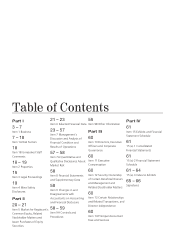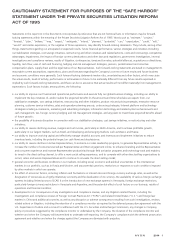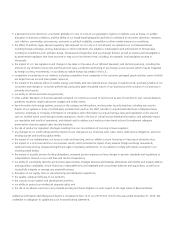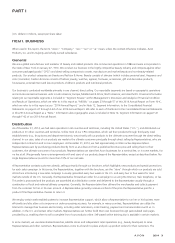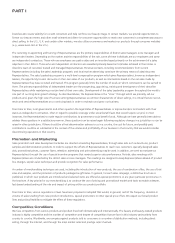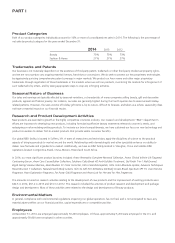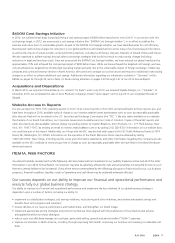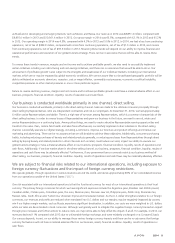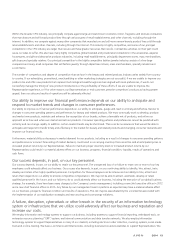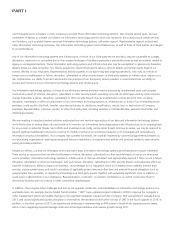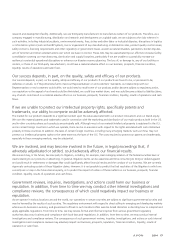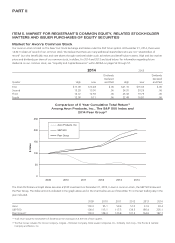Avon 2014 Annual Report Download - page 18
Download and view the complete annual report
Please find page 18 of the 2014 Avon annual report below. You can navigate through the pages in the report by either clicking on the pages listed below, or by using the keyword search tool below to find specific information within the annual report.PART I
Another risk associated with our international operations is the possibility that a foreign government may impose foreign currency
remittance restrictions. Due to the possibility of government restrictions on transfers of cash out of the country and control of exchange
rates, we may not be able to immediately repatriate cash at the official exchange rate. If this should occur, or if the official exchange rate
devalues, it may have a material adverse effect on our business, assets, financial condition, liquidity, results of operations or cash flows. For
example, currency restrictions enacted by the Venezuelan government in 2003 have become more restrictive and have impacted the ability
of our subsidiary in Venezuela (Avon Venezuela) to obtain foreign currency to pay for imported products, which in turn has reduced our
product offerings in Venezuela and negatively impacted our sales. Unless foreign exchange is made more readily available, Avon Venezuela’s
operations will continue to be negatively impacted as it will need to obtain more of its foreign currency needs from non-government sources
where the exchange rate is less favorable than the official rate.
Inflation is another risk associated with our international operations. Gains and losses resulting from the remeasurement of the financial
statements of subsidiaries operating in highly inflationary economies are recorded in earnings. High rates of inflation or the related
devaluation of foreign currency may have a material adverse effect on our business, assets, financial condition, liquidity and results of
operations or cash flows. For example, Venezuela has been designated as a highly inflationary economy. See “Segment Review – Latin
America” within MD&A on pages 40 through 45 of our 2014 Annual Report for additional information regarding Venezuela. In addition,
there can be no assurance that other countries in which we operate, such as Argentina, will not also become highly inflationary and that our
revenue, operating profit and net income will not be adversely impacted as a result.
We are subject to a deferred prosecution agreement with the U.S. Department of Justice (the
“DOJ”) and a consent to settlement with the U.S. Securities and Exchange Commission (the
“SEC”) which require us to retain, at our own expense, an independent compliance monitor.
With the approval of the DOJ and the SEC, the monitor can be replaced 18 months after the
monitor’s retention by the Company pursuant to its agreement to undertake self-reporting
obligations for the remainder of the monitoring period. The monitoring period expires on the
later of three years from the date of the retention of the monitor and the expiration of the
DPA. We will incur costs in connection with these obligations, and compliance with these
obligations could divert members of management’s time from the operation of our business.
Such costs and burdens could be significant.
In December 2014, the U.S. District Court for the Southern District of New York (the “USDC”) approved a deferred prosecution agreement
between the Company and the DOJ (the “DPA”) and in January 2015, the USDC approved a consent to settlement with the SEC (the
“Consent”) in connection with the previously disclosed Foreign Corrupt Practices Act (the “FCPA”) investigations.
Under the DPA and the Consent, among other things, the Company agreed to have a compliance monitor (the “monitor”). With the
approval of the DOJ and the SEC, the monitor can be replaced 18 months after the monitor’s retention by the Company pursuant to its
agreement to undertake self-reporting obligations for the remainder of the monitoring period. The monitoring period expires on the later of
three years from the date of the retention of the monitor and the expiration of the DPA. We are in the process of retaining a monitor,
whose selection is subject to the approval of the DOJ and the SEC. There can be no assurance as to when a monitor will be approved or
whether or when the DOJ and the SEC will approve replacing the monitorship with the Company’s self-reporting.
Under the DPA, the Company also represented that it has implemented and agreed that it will continue to implement a compliance and
ethics program designed to prevent and detect violations of the FCPA and other applicable anti-corruption laws throughout its operations.
The monitor will assess and monitor the Company’s compliance with the terms of the DPA. The monitor may recommend changes to our
policies and procedures that we must adopt unless they are unduly burdensome or otherwise inadvisable, in which case we may propose
alternatives, which the DOJ and the SEC may or may not accept. In addition, operating under the oversight of the monitor may result in
burdens on members of our management and divert their time from the operation of our business. Assuming the monitorship is replaced by
a self-reporting period, the Company’s self-reporting obligations may continue to be costly or burdensome.
We currently cannot estimate the costs that we are likely to incur in connection with compliance with the DPA and the Consent, including
the retention of the monitor, the costs, if applicable, of self-reporting, and the costs of implementing the changes, if any, to our policies and
procedures required by the monitor. However, the costs and burdens of the monitoring process could be significant.


